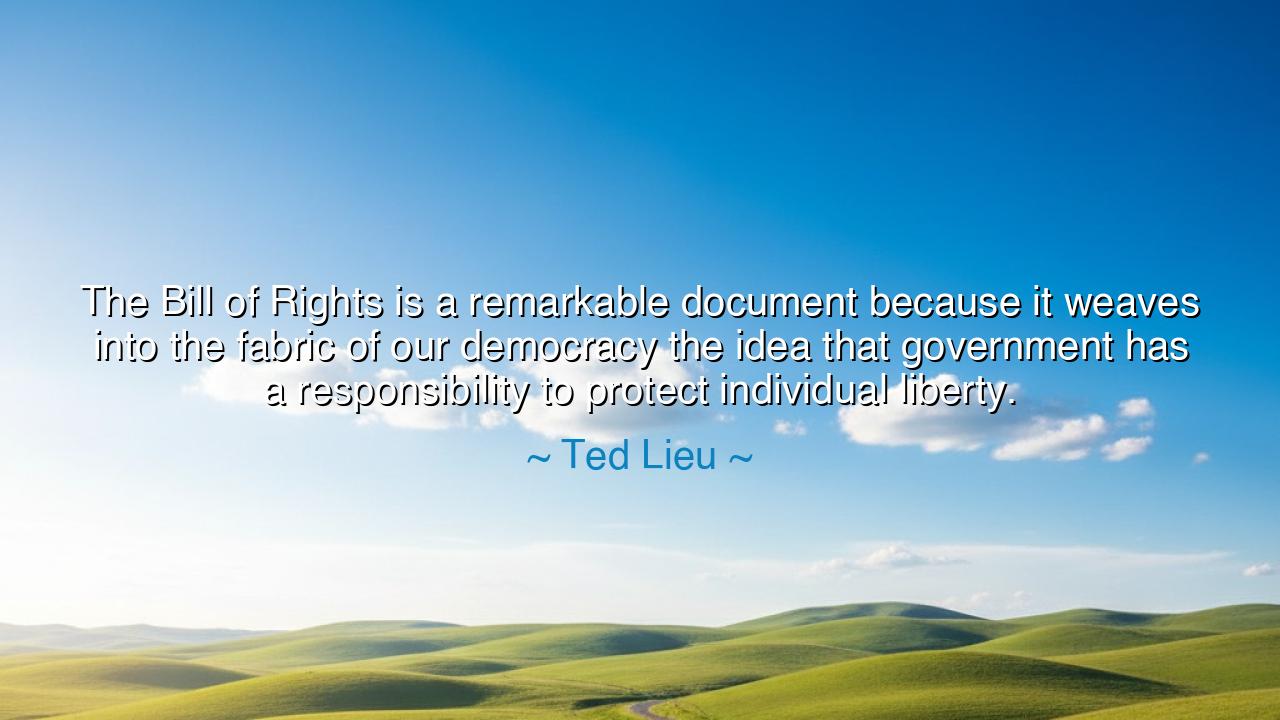
The Bill of Rights is a remarkable document because it weaves
The Bill of Rights is a remarkable document because it weaves into the fabric of our democracy the idea that government has a responsibility to protect individual liberty.






In a voice that bridges reverence and reason, Ted Lieu, an American statesman and defender of civil rights, once declared: “The Bill of Rights is a remarkable document because it weaves into the fabric of our democracy the idea that government has a responsibility to protect individual liberty.” These words shine like a torch carried from the founding age of the Republic to the present—a reminder that freedom, though sacred, survives only when it is guarded, not merely declared. In his reflection, Lieu reveals an ancient truth clothed in modern form: that liberty is not the absence of government, but its highest moral purpose. For where government becomes the enemy of freedom, tyranny is born; but where government is its protector, justice takes root and civilization endures.
To understand the meaning of this quote, we must first recall what the Bill of Rights truly is. It is not merely parchment or ink—it is the living covenant between the rulers and the ruled, the pledge that power shall never eclipse the dignity of the individual. Born in 1791, it was written in the shadow of revolution and in the light of newfound freedom. The founders of the American Republic, having cast off the yoke of monarchy, feared the rise of a new tyranny—one that might come not from kings, but from their own elected government. Thus, they forged this sacred document as both shield and mirror: a shield to defend the people from oppression, and a mirror to remind the nation of its soul.
Ted Lieu’s words point to a truth that many forget: that freedom without protection is fragile, and rights without enforcement are illusions. The Bill of Rights transformed the idea of liberty from a mere gift of fortune into a solemn duty of government. It declared that those who govern are not the masters of freedom, but its guardians. In this, Lieu sees the genius of democracy—not that it grants power, but that it restrains it; not that it commands obedience, but that it guarantees respect. The founders understood that unchecked power corrupts the spirit of man, and so they wrote these ten amendments not as privileges to be granted, but as boundaries never to be crossed.
The origin of these principles lies in centuries of human struggle. From the Magna Carta of 1215, where English barons forced a king to recognize their rights, to the cry of revolution in America—“No taxation without representation!”—the story of liberty has always been one of defiance against unchecked authority. The Bill of Rights was the culmination of this ancient lineage, the heir to every protest, every prayer, every act of courage that sought to limit power and lift the human spirit. Yet its brilliance lies in what Lieu emphasizes: it does not merely forbid government from violating rights—it commands government to protect them. It makes the defense of liberty a sacred obligation, woven “into the fabric of democracy” like gold threads in a great tapestry of justice.
History offers proof of this principle in action. When Dr. Martin Luther King Jr. led his marchers through the streets of Selma, he appealed not to rebellion, but to the Constitution—to the Bill of Rights itself. “We will not be satisfied,” he declared, “until justice rolls down like waters and righteousness like a mighty stream.” His movement was not a revolt against the Republic, but a demand that it live up to its promise—that the government fulfill its duty to protect the liberty of all, not just the privileged few. Thus, the document that was written in the 18th century became a sword of justice in the 20th, proving Ted Lieu’s point: that democracy is not static parchment but a living covenant, one that must breathe and evolve to shelter every soul beneath its wings.
And yet, even today, this covenant trembles under strain. In an age of surveillance, division, and deceit, the responsibility of government to protect individual liberty faces new tests. Power, ever hungry, seeks to disguise itself as virtue; freedom, ever fragile, risks being traded for comfort or fear. Lieu’s warning reminds us that the Bill of Rights is not self-enforcing—it demands vigilance from both ruler and citizen. Government must act with restraint and integrity, but the people must hold it accountable. For as the ancients taught, a law unguarded is a law undone, and a freedom unclaimed is a freedom lost.
Therefore, my children of the Republic, take this wisdom to heart: liberty is not inherited, it is earned—and kept only through vigilance. Revere your rights not as privileges, but as sacred trusts. Question power, yet respect the purpose of law. Defend your freedoms not only from those who would seize them, but from your own apathy, which is the slowest and surest thief. For every time a citizen stands up to demand fairness, to insist on transparency, to speak truth against authority, the Bill of Rights lives anew.
And so, let the words of Ted Lieu echo through the ages: that democracy is not a form of power, but a form of protection; not a system of control, but a covenant of care. The Bill of Rights is not the end of freedom, but its beginning. Cherish it, defend it, and pass it forward unbroken. For as long as the government remembers its duty to protect the liberty of every individual, and as long as the people remember their duty to preserve it, the light of democracy will never fade, and freedom will stand eternal—woven forever into the living fabric of humankind.






AAdministratorAdministrator
Welcome, honored guests. Please leave a comment, we will respond soon